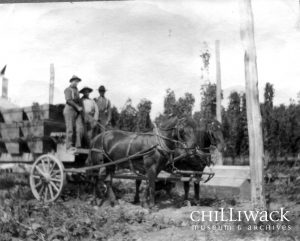The First Nations hop workers were dedicated and loyal to their work. In an interview by Ron Denman to Cece Shaw in 1989, Shaw stated…
“the native people were the backbone of the hops. It was mostly the women, the women would come up with the families and they stayed. Weather didn’t bother them that much. Some of them would have their babies out in the field and come back picking in the afternoon or something like that. They stayed with it. Whereas the white would come and go. If they didn’t do well they’d be gone”. -Cece Shaw, 1989
Many First Nations hop workers would get together and play various games on the weekends. Teresa Michell said “they gather up, build a big fire, and they play bone games on Saturday night and Sunday. And they have this Indian dance…” (Coqualeetza Archives, 1976).
Dolly Felix also reminisced on this memory and stated that “they used to dance in the kiln, where they dry the hopes and everything I was telling you about… After hop picking they used to have sports-best runners, best jumpers, boxers, wresting, everything” (Coqualeetza Archives, 1976).
“on Saturday the young people would dance. Lots of young people meet different young people and a lot of them would get married. Meet different people from different places…”-Jean Silver (Coqualeetza Archives, 1976).
So as we can see, the First Nations were hard workers who liked to have fun during the downtime of their hop yard work. It’s safe to say that with these games, dances, and sporting events that took place on the yards that they probably included everybody in these events. We can assume this mainly from Jean Silver’s comment of the young First Nations people meeting different people from different places. The First Nations hop workers were more than just hop workers, they were a family.
